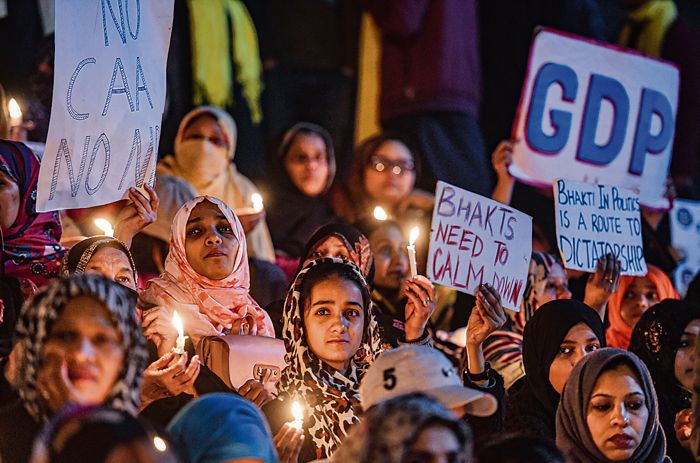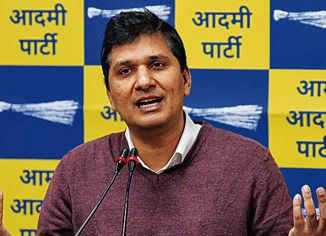
Too much too soon: From demonetisation to GST to the latest CAA-NRC-NPR, the ‘surprise decisions’ are hitting hard our economy and social fabric.
Gurbachan Jagat
Former Chairman of UPSC and former Governor of Manipur
The year 2014 saw a dramatic change in the political landscape of India as the BJP led by the all-conquering Narendra Modi came to power at the Centre with absolute majority. This was preceded by months of a hurricane campaign led by Modi’s mesmerising speeches. As expected, he became the PM and the euphoria generated by the electoral speeches and the promises continued. Every section of society expected a bonanza—farmers expected better prices for their produce, writing off their debts, unemployed youth expected the generation of jobs by millions and the abject poor hoped for better housing, education and health facilities.
In short, everyone expected that a magic wand would be waved and the whole country would be one huge prosperous entity. Of course, the thinking members of society did not expect any miracle, but they did expect a change for the better in basic conditions of life. Everyone waited for the promises of achhe din, money in their accounts, jobs for youth, health and educational facilities for the common man. These promises continued even after Modi’s anointment as PM. Not much happened in the first few months, but people were patient as they had faith in his leadership.
However, lightning struck one morning in the form of demonetisation that left all sections of society shell-shocked. However well-intentioned, it had a disastrous effect on the economy; and combined with poor implementation of GST, people were in real trouble. Trouble brewed between the RBI and Centre and the banking sector also showed signs of weakening. To cut a long story short, delivery on the poll promises was not up to expectations. But the people still kept their faith in PM Modi’s leadership.
Things were looking a bit uncertain for the ruling party before the 2019 General Election. It had lost three Hindi-heartland states of Rajasthan, MP and Chhattisgarh to the Congress. Then, the tragic strike at Pulwama took place, and showing great determination, courage and foresight, India struck back across the border with Pakistan, forcing the latter to tone down its aggressive postures. This action of the PM galvanised the nation and helped the BJP in sweeping the 2019 Lok Sabha elections. The tsunami of the last Lok Sabha results virtually decimated the Opposition setup.
The expectations rose even higher as the people thought nothing could come in the way of rapid development. But, each passing day, only increased the level of disappointment on the economic front — unemployment rose to staggering heights, the GDP forecast continued getting lower and lower, inflation began rising and the prices of essential commodities kept increasing.
In order to salvage the economy, the RBI was pushed to give in to the demands of the Centre by way of money from its strategic reserves. In that tussle between the Centre and RBI, the then RBI Governor, Raghuram Rajan, had to go, and after sometime, the government-nominated Urjit Patel also left as RBI Governor. An all-pervasive air of gloom began to spread across the country as the economy continued to fall further into the doldrums.
In place of economic relief, the Centre initiated various other measures which had been in its manifesto. Article 370, which granted special status to J&K, was revoked and the state was downgraded to the status of union territories of Jammu and Kashmir and Ladakh and Kargil. Although the timing was unexpected, this decision was welcomed by the people. However, there was a strong opposition from the Valley and the government had to take strong preventive measures in the interest of law and order and security, including taking into custody three former CMs of J&K and other political activists and shutting down the Internet and cellphone services. The provisions of Section 144, CrPC, were used and the movement of people was restricted. The people responded with bandh calls. As a result, tourism came to a halt, business remained shut, school, colleges and hospitals remained closed. This situation lasted for almost five months and complete normalcy is yet to prevail.
While this was still ongoing, the BJP government came up with the Citizenship Amendment Act (CAA) to be followed by the announcements of NCR and NPR. This has led to great unrest throughout the country. Opposition parties are describing it as a ploy to divert attention from the real issue of declining economy. The Northeast, which had returned to almost complete normalcy, began to grow restless again due to misapprehensions in regard to the above measures. In BJP-ruled Assam itself, trouble erupted and large-scale protests are still going on. The Assamese are totally dissatisfied with the NRC process in the state, fearing the onset of demographic changes. Similarly, Nagaland, Mizoram, Meghalaya and Manipur also expressed grave apprehension and started demanding certain guarantees to ensure that no outsider would be allowed to change the demographic picture, distinct culture and identity of these states.
The enactment of CAA also led to a new dimension in Centre-state relations. Some Opposition-ruled states have passed resolutions in their Assemblies against CAA. This kind of confrontation has rarely been seen before and it bodes ill for the future of the federal structure. This would also mean that it would be difficult for the Centre to implement this Act without the assistance of the states. Also, it will set a dangerous precedent for the future. Anyway, we have to wait for the SC ruling regarding the constitutional validity of this Act.
The most important development during this time has been the students’ unrest across campuses. What began as a protest over an innocuous problem in JNU has snowballed into a major movement because of inept handling of the situation by some state governments. Instead of having a dialogue with students, an attempt was made to put down the protest with the brute use of police force and bringing in lumpen elements from outside to beat up the students.
The students’ movement must also be seen with other movements against CAA-NRC-NPR. Significantly, Muslim women have come out in big numbers and are carrying on their agitation. The involvement of students and women has caused a major problem for the Centre. Although it is defending CAA etc., it is almost completely silent on the economy. Instead of enunciating measures to improve the economy, elements within the government and the BJP are raising the pitch against students, intellectuals, artistes, etc., and labelling them as ‘parasites’ and threatening to ‘bury them alive’. At various places in Delhi, UP and Karnataka, the police have been let loose to use extreme force against the protesters.
The abrogation of Article 370 has drawn adverse reactions from the US, EU and Islamic states. Even the PM of Bangladesh, otherwise our close supporter, has come out against CAA, although she clarified by saying that it was an internal matter of India. All this has taken away some of the lustre from the foreign policy successes of the PM.
Most of our embassy staff around the world is now engaged in convincing the world about the benefits of the abrogation of Article 370 and CAA. Foreign policy is a field in which Modi invested heavily and it is sad to see that some of his goodwill is being lost. It will take considerable time and an honest assessment to see where we have gone wrong and institute corrective steps.
Meanwhile, a new issue has come out with the call of RSS chief Mohan Bhagwat that the family size should be limited to two children. Although the subject of population control is very important and necessary, its timing is suspect as the nation is already in ferment over the above narrated issues. Then again, the elements within the ruling party’s higher echelons keep reminding us about our glorious past. There is no doubt that right from the Vedic time, we have had a golden past, but the question now is to make our present and future glorious. Merely talking about the mythological past and erecting tall statues are not going to change the future of the vast populace. I am reminded of Percy Bysshe Shelley’s poem Ozymandias: Two vast and trunkless legs of stone/Stand in the desert/And on the pedestal these words appear:/’My name is Ozymandias, king of kings/Look on my works, ye mighty, and despair!/Nothing beside remains. Round the decay/ Of that colossal wreck, boundless and bare/The lone and level sands stretch far away.
To conclude, the PM and his government need to initiate a dialogue with different groups of people involved in these protests. In every human relationship, whether it is between master and servant, husband and wife, father and son and employer and employee, there is always a compromise to carry forward the relationship for its smooth functioning. This essentially entails some sort of ‘give and take’ from both sides. It should not be seen as a sign of weakness. Instead of surprise decisions, it would be better to initiate a debate and discussion on the subjects of national importance, so that views of all stakeholders are known and respected.
As part of this dialogue, the government has to answer the questions: when are achhe din coming? When is the income of farmers going to double? When is the farmers’ debt going to be waived? When will employment for youth be generated? When is the infrastructure going to be built on the required scale? When is the major investment going to be made by foreign and domestic industrialists to boost the economy? These are some of the problems agitating the minds of the people who are now not prepared to be taken in by political sloganeering or by creating diversions. The CAA, NRC and NPR may have their pros and cons, but they need to be put on the backburner—the first priority was, is and shall continue to be the economy.
Join Whatsapp Channel of The Tribune for latest updates.























